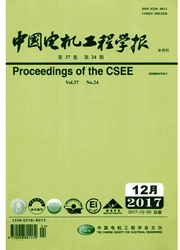

 中文摘要:
中文摘要:
在压力22.5~28MPa,质量流速600~1000kg·m-2·s-1,工质比焓800~3100 kJ·kg-1范围内,对超临界水在四头内螺纹管内的流动阻力特性进行了试验研究,得到了不同工况下内螺纹管流动阻力的变化规律,分析了压力、质量流速和工质比焓变化对内螺纹管摩擦阻力系数的影响。试验结果表明:超临界压力下质量流速对摩擦阻力压降有很大影响,但对摩擦阻力系数的影响很小;在拟临界区域摩擦阻力系数有阶跃式增长现象,且这种阶跃增长现象随着压力的增加而减弱。整理试验数据得到超临界水的内螺纹管摩擦阻力系数经验关联式,与试验值相比误差小于15%,为设计具有良好水动力特性的超临界锅炉提供可靠依据。
 英文摘要:
英文摘要:
The flow resistance characteristics of water in an internally ribbed tube was studied experimentally at different pressures from 22.5 to 28 MPa, mass fluxes from 600 to 1 000 kg.m-2.s-1, and bulk fluid enthalpy from 800 to 3100kJ.kg-l. The variation of flow resistance was obtained and the effects of pressure, mass flux and bulk fluid enthalpy on the frictional flow resistance coefficient of the internally ribbed tube were analyzed. The experimental results show that under supercritical pressures, with increasing mass flux, the frictional resistance pressure drop increases rapidly while the change of frictional resistance coefficient is little. A step growth of the frictional flow resistance coefficient occurs when the bulk fluid temperature is near the pseudo-critical temperature. The step growth phenomenon decreases with increasing pressure. On the basis of the test data, the practical corresponding empirical correlations of the frictional resistance coefficient were presented with a possible error below 15% compared with experimental measurements. The empirical correlations may confidently be used to design supercritical boiler with good hydrodynamic characteristic.
 同期刊论文项目
同期刊论文项目
 同项目期刊论文
同项目期刊论文
 Investigation on the characteristics and mechanisms of unusual heat transfer of supercritical pressu
Investigation on the characteristics and mechanisms of unusual heat transfer of supercritical pressu Investigation of forced convection heat transfer of supercritical pressure water in a vertically upw
Investigation of forced convection heat transfer of supercritical pressure water in a vertically upw Numerical Investigation on the Mixed Convection and Heat Transfer of Supercritical Water in Tubes in
Numerical Investigation on the Mixed Convection and Heat Transfer of Supercritical Water in Tubes in Evaluation of the correlations for prediction of the heat transfer coefficients of supercritical pre
Evaluation of the correlations for prediction of the heat transfer coefficients of supercritical pre 期刊信息
期刊信息
